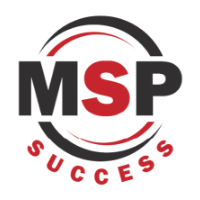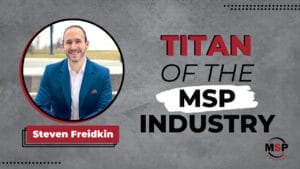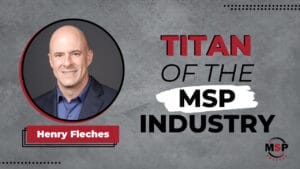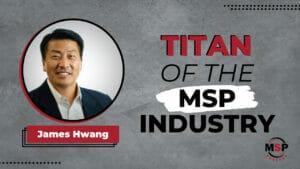Rob Stephenson, CEO of Thrive Networks, discusses his career path in the IT industry and offers critical advice for MSPs looking to increase their value.
Note: This article was taken from a live interview and has been edited for length and clarity.
Rob Stephenson, CEO of Thrive Networks, evolved from running a sales department to heading a $300 million dollar company. Thrive Networks’ astronomical growth would not have been possible without his savvy sales techniques and technological know-how.
Robin Robins, founder of MSP Success Magazine, interviewed this titan of the tech industry to learn the secrets to his success. Read on for the choices he’s made throughout his career that enabled his many notable achievements and his expert advice for smaller MSPs looking to replicate his tremendous success.
Robin Robins, Founder, MSP Success Magazine and Big Red Media: Hi Rob, great to talk with you today. Can you tell us a bit about Thrive Networks, just to get started?
Rob Stephenson, CEO of Thrive Networks: Thrive Networks was founded in 2000. I started consulting in 2015 for the former owner and fully came onboard in 2016. When I first started consulting, they were doing about 10 or $11 million a year. Now we’ll do more than $300 million a year.
Robin: I’d like to talk a little bit about how you, personally, got your start. You started out as a sales representative for Eastern Telecom, right? Is that how you got into the IT realm?
Rob: That’s right. I started my career doing construction sales in the early ‘90s, up until about ‘96, ‘97. A lot of my construction projects were data centers. It was right at the advent of the Internet, and I got fascinated by it. At the same time, I was getting my MBA and taking classes at night, and I thought there might be something to this whole Internet thing. I moved into telecom infrastructure shortly after that.
Robin: And then you became the Northeast Regional Channel manager for Internet and then Internet networking services and climbed the ladder that way. What was the first business you started? Was that Access Northeast?
Rob: Yes. I didn’t start it, but I was a third or fourth employee. They were an ISP and one of my customers at Eastern Telecom. I had bailed them out of a pretty big jam at one point—I helped them with their frame relay network. They were connecting all their clients to internet ports via frame relay, and I had some connections at Verizon in their frame relay group and helped them fix that. They remembered that. And you know, I brought them a lot of business. I was their number one referral partner; eventually, they wanted me to come on to run sales.
I ended up coming on to run sales for them in 2002 and really transformed them from an ISP into a colocation provider. We built out a VMware-based private cloud in 2005 and then began building out an MPLS network. Then, we started doing managed services and managed security. We did everything that a managed service provider today would do, except for help desk. We also bought out some silent partners in 2007. And at that point, when private equity came on board, they wanted me to take the CEO position. That’s where I’ve been for the last 16 years—a CEO with a financial back. But really, I’m still a salesperson at heart.
I sold Access Northwest to Abry Partners in 2012. They merged it with one of their portfolio companies, and I stayed on for about a year or two as their chief marketing officer and ran all sales and marketing for them. I was on the board when we sold to TierPoint, I believe, in 2015.
Robin: Okay, great. Over the course of your career, are there any people you’ve met or experiences that you’ve had that enabled you to do what you’re doing today?
Rob: That’s a great question. I think getting my MBA was probably the best thing I ever did. It helped me understand how the business puzzle pieces came together, allowed me to understand how private equity models work and how you can raise capital from them.
The first thing I did that really helped was forgo my commissions at Access Northeast when they were basically a break-even company. The first 2 or 3 years, I didn’t collect any commissions; instead, I traded them for stock. There’s a value to getting a piece of the puzzle if you believe in yourself and you’re working hard to drive and grow a company. Once we built up enough value in the business, we went out and raised the capital and bought out some of the silent partners that had reached the financial goal that they were looking to get out of the business and weren’t adding day-to-day operational value. So those were big things.
I had some mentors along the way as well. One is a gentleman, Rob Shanahan, at Lightower. He built Lightower coming from Comverse Communications. He sold that to Crown Castle for, I believe, close to $10 billion; he’s a very successful CEO. We were his largest customer when he was at Converse Communications. He gave great advice about how to think about and build a business. We were partners for a long, long period of time. He’s since retired, but he provided lots of helpful insight and guidance for my career. His chief legal officer, Dave Mayer, was very helpful to me in my career as well.
Robin: Great. I’m sure you’ll see this even better than I do, since you have so much hands-on experience. What mistakes do you see other MSPs making? Are there any mindset differences that are hurting their growth?
Rob: Not having long-term contracts is a big mistake. We see a lot of small businesses that have 30-day-out clauses in their contracts. The client has all of these obligations that the MSP has to work with: scope of work, limitation, liability, breach, etc., while the client essentially only has to pay 30 days’ rent. That’s all the only obligation the client has. At that point, I’d rather just bill them month-to-month and have no contract at all. Just do an ongoing project with that client, and either of you can walk away at any time. Now what I’m talking about specifically is a 30-day-notice clause in the contract. Once you put that in there, it doesn’t matter how long your contract is for. The client might sign it as a three-year contract. But if that clause is in there, any client with a lawyer will know it’s really only 30 days.
The bare minimum for a contract should be a one year and an auto renewal. I believe that contracts should all be two and three years depending on the service. Most cybersecurity services or cloud services are all three years. That way, the client can’t just get out of a contract anytime they’d like.
Another struggle MSPs have is with price increases or changes to a contract. I’ll give you an example. Basically, we told our clients that with all the threats that Office 365, we’re making SaaS Alerts a mandatory part of our security stack. We sent out a notice to all of our clients saying that it’s a couple of bucks a month per box. If you want to opt out, you can click this button and it will take it off your bill. We’ll remove the tool, but you’re going to need to sign the security waiver that you hereby accept all responsibility for any cybersecurity breach related to Office 365. We have zero customers that sign that.
We have a couple that came and negotiated the price a little bit because that’s what they like to do, but the majority just accepted it. It’s a good tool, a good service, and the client is better protected.
I would avoid having that conversation individually with clients, since you’ll keep having it forever. Instead, do more automated campaigns where you just say, “Hey, we’re making this part of our stack. Here’s an opt-out if you want it, but you need to sign a waiver because this is our best recommendation.” The value here is twofold. One, you get a sale uptick. Two, you also get a ticket decrease because that’s a good tool that’s preventing legitimate threats and issues. That will also give you the ability to take on more clients without having to hire more engineers.
Finally, they’ve got to embrace cybersecurity and the cloud. I’ve seen a lot more of that in the last few years. The public cloud makes it a lot easier to get into that business than to build out or wholesale a private cloud like we did years ago. Having clients that have everything on-site is going to harm your business and stunt your growth. It’s important to have all those servers operating in a private cloud. It’s easy to maintain it, easy to protect it, and even easier to manage it. You’re going to scale much better.
And of course, I think it’s important to build out a cybersecurity stack. A profile I recommend, if they can fit it in budget, is to hire a vCISO and rent it out to the clients that want to build out security programs. The practice will build from there. You’ll build the stack and have all the tools, but you’ll capitalize on your revenue and have less tickets because all these customers are putting in the right security tools. The more of those advanced services that you sell to your clients, the less tickets you have, the happier the client is, and the more revenue you have. It all becomes a circular reference issue that one feeds into the other and really helps raise your health profile.
Robin: Yeah, absolutely. I love it. A lot of these MSPs don’t have much money to work with to have the tools and hire the talent they need to grow. What’s your advice for folks in that situation?
Rob: I think it all starts with profitability. If you only have five customers, you have to make sure they’re really profitable. They’re going to have needs depending on their size and scope. A small one-site hardware store has different needs than a 16-site physician’s practice. Whatever your clients’ needs, look at them as if you’re their IT manager. It’s important that you look at everything you need to do to protect that client. We try to include a platinum product and a bronze product in every category, so that the client can have some options. Clients like options; they hate being told what to do. Explain to them the benefits of the platinum product and tell them it’s what you recommend. The bronze option will get the job done but have some deficiencies. That way, the client has options and feels good about making that choice.
But the number one thing I would say is: build out a product catalog. Go with one vendor. If you’re trying to manage multiple platforms at once, you’re probably not going to be able to scale that business and do too well. You’re not going to have the engineering talent to be able to handle all those platforms at once. Pick one of those platforms, become a partner, and make sure their sales reps get to know you. You’ll get better at what you do and get leads via word of mouth from the sales reps you work with. So, whether you choose Cisco or Fortinet or Meraki, pick one and make it your stack.
Robin: Love it, great stuff. I wanted to ask, was it harder for you to start a completely new business, like Access Northwest, or grow an existing MSP like you’re currently doing with Thrive Networks?
Rob: Great question. I would say it was harder the first time around because of all those doubts due to lack of experience. You’re always wondering, “Can I really do this?” So, I’d say the first time is always the hardest for that reason. Once you get started and get a good crowd of people around you and have a track record of success, it’s much easier to keep growing. Starting out Thrive was much harder in year one than it is right now in year eight. Candidly, there’s more complex issues, but we also have more people and resources to handle them. We’ve been able to retain a lot of the talent from the great businesses that we’ve acquired. When you have a great team of people, it becomes easier, especially once you start feeling confident about what you’re doing.






